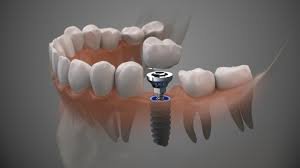Dental implants are a long-term solution for replacing missing teeth, offering a natural look and feel. One of the main benefits of implants is their longevity compared to other options like dentures or bridges. However, just like any medical procedure, they come with their own set of expectations regarding lifespan and maintenance. In this post, we’ll explore what you can expect in terms of the lifespan of dental implants, factors that influence their durability, and how to ensure they last as long as possible.

1. The Typical Lifespan of Dental Implants
Dental implants are known for their remarkable durability. On average, dental implants can last anywhere from 20 to 25 years, and many last even longer with proper care. The titanium post that fuses with your jawbone is designed to be permanent, while the crown or restoration on top may require replacement over time due to wear and tear.
What Affects the Lifespan:
- Material Quality: The titanium used for implants is highly durable and resistant to corrosion, contributing to its long lifespan.
- Maintenance: Good oral hygiene and regular dental visits can help maintain the integrity of your implants and the surrounding bone structure.
When to Expect Wear:
- Implant Post: The titanium post itself can last a lifetime if the surrounding bone remains healthy.
- Restoration/Crown: The crown or bridge placed on top of the implant may need replacement after 10 to 15 years due to natural wear.
2. Factors That Influence Implant Longevity
While dental implants are known for their long-lasting nature, several factors can influence how long they will last. These include your overall health, oral hygiene habits, and lifestyle choices. Let’s break down the key factors.
Oral Hygiene and Care:
- Regular Brushing and Flossing: Daily brushing and flossing are crucial for keeping the implant area clean and free of plaque buildup. Neglecting oral hygiene can lead to infections or gum disease, which may compromise the implant.
- Professional Cleanings: Regular dental checkups and cleanings help ensure that the implant and surrounding gums are in good condition.
Bone Health:
- Jawbone Density: The strength and health of your jawbone are vital for the long-term stability of the implant. Adequate bone density allows the implant to fuse properly with the bone in a process called osseointegration. If the bone weakens over time, the implant may become loose.
- Bone Loss Prevention: Regular visits to your dentist can help catch any bone loss early, allowing for preventive treatments such as bone grafting.
Lifestyle Choices:
- Avoid Smoking: Smoking can significantly reduce the chances of successful osseointegration and increase the risk of gum disease and infection, all of which can impact the longevity of your implants.
- Avoid Excessive Force: Habitual teeth grinding (bruxism) or chewing on hard objects can put unnecessary strain on your implants and the surrounding teeth.
3. How to Extend the Lifespan of Your Dental Implants
Taking proactive steps to care for your dental implants can help you maximize their lifespan. Here are some tips for keeping your implants in excellent condition:
Practice Excellent Oral Hygiene:
- Brush Regularly: Brush your teeth at least twice a day using a soft-bristled toothbrush and non-abrasive toothpaste. Make sure to clean around the implant and the crown to prevent plaque buildup.
- Floss Daily: Flossing helps remove food particles and plaque from between the teeth and implants, where a toothbrush may not reach.
- Use Mouthwash: Consider using an antimicrobial mouthwash to help prevent gum infection around the implant area.
Attend Regular Dental Checkups:
- Routine Examinations: Regular dental visits allow your dentist to monitor the condition of your implants, gums, and bone health. They will check for any signs of infection, loosening, or wear.
- Professional Cleanings: In addition to regular checkups, professional cleanings ensure that your implants remain free of plaque and tartar buildup.
Consider a Night Guard:
- Prevent Teeth Grinding: If you grind your teeth at night, your dentist may recommend wearing a night guard. This device protects your implants and natural teeth from excessive pressure that can cause damage.
4. When to Replace Implant Restorations
While the titanium post of a dental implant is designed to last a lifetime, the crown or bridge on top may require replacement after some time. Factors like chewing pressure, diet, and overall wear and tear can cause the crown to degrade. On average, implant restorations last 10 to 15 years, but with proper care, they may last even longer.
Signs Your Implant Restoration Needs Replacement:
- Cracks or Chips: If your crown is cracked, chipped, or broken, it may need to be replaced to maintain proper function and aesthetics.
- Loose Crown: A crown that feels loose or shifts may require adjustment or replacement to ensure the implant remains securely in place.
- Wear and Discoloration: Over time, a crown may show signs of discoloration or wear, which may be a signal that it needs replacement.
How to Replace a Restoration:
- Consult Your Dentist: Your dentist will evaluate the condition of your implant and restoration, and if necessary, will take impressions to create a new crown or bridge that fits perfectly.
- Avoid Delay: Replacing a damaged or worn crown promptly helps prevent further complications, such as implant failure or discomfort.
5. Potential Risks to Implant Longevity
Although dental implants are designed to last for many years, certain factors can contribute to complications. Common risks to the longevity of dental implants include:
Infection or Peri-implantitis:
- What It Is: Peri-implantitis is an infection of the tissues surrounding the implant, which can lead to bone loss and implant failure if not treated promptly.
- Prevention: Proper oral hygiene and regular dental visits are essential for preventing infections around your implant.
Implant Failure:
- Possible Causes: Implant failure can occur due to poor osseointegration, infection, or excessive force applied to the implant.
- Solution: If an implant fails, it may need to be removed and replaced. Your dentist will guide you through this process.
Conclusion
Dental implants are an excellent long-term solution for tooth replacement, with a lifespan that can last 20 years or more with proper care. By practicing good oral hygiene, attending regular checkups, and taking precautions to protect your implants, you can ensure they last as long as possible. Although the titanium post itself can last a lifetime, the restoration may need replacement every 10 to 15 years. As with any dental treatment, it’s important to be proactive in caring for your implants to ensure they remain functional, healthy, and aesthetically pleasing for years to come.











